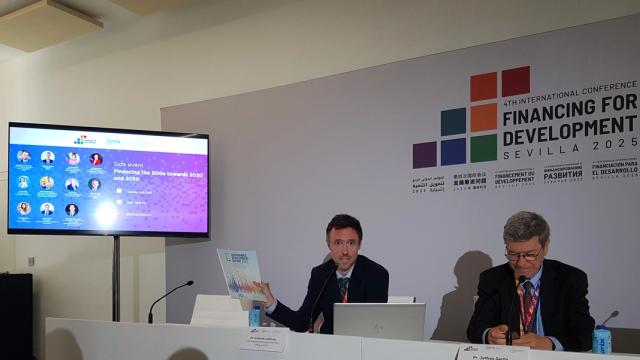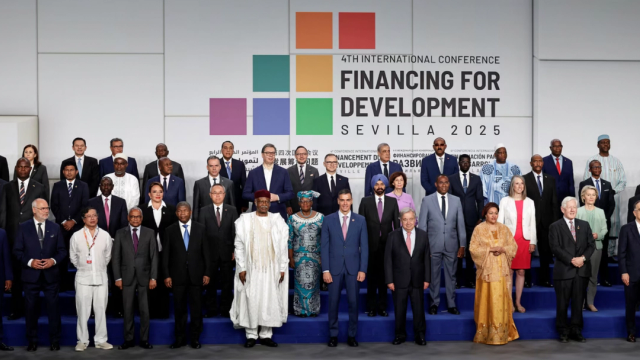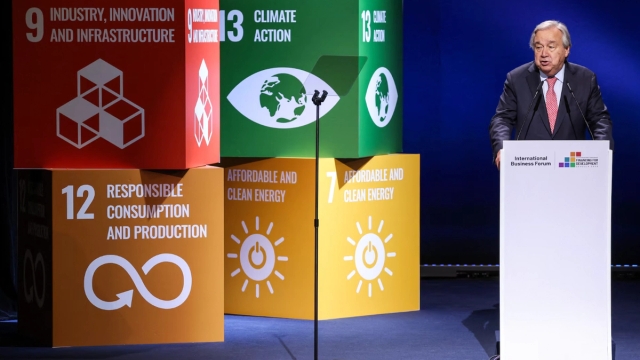Financing for Development: Reflections from the 4th International Conference on Financing for Development
From June 30 to July 3, 2025, the UN Sustainable Development Solutions Network (SDSN) participated in the 4th International Conference on Financing for Development (FfD4) in Seville, Spain.
Ten years after the Addis Ababa Action Agenda (FFD3, 2015), stakeholders convened to advance crucial reforms to the Global Financial Architecture (GFA), the system of public and private finance that channels the world’s savings into investment. The event brought together nearly 60 world leaders, representatives from over 150 countries, and around 15,000 delegates from governments, financial and trade institutions, businesses, and civil society.
Opening Remarks
The UN’s Secretary-General, António Guterres, opened the conference warning that “financing is the engine of development and right now, this engine is sputtering,” and reminding the audience that “as we meet, the 2030 Agenda for Sustainable Development — our global promise to transform our world for a better, fairer future — is in danger.” Guterres described the conference’s outcome document, the Sevilla Commitment (Compromiso de Sevilla), adopted by all parties present, as a “global promise” to empower and uplift low-income nations.
On behalf of the host country, the Prime Minister of Spain, Pedro Sanchez, advocated for a new financial system that provides justice and prioritizes developing countries by reforming the GFA to be more effective. Additionally, President Ursula von der Leyen, representing the European Union, reaffirmed that “Europe is ready to invest and to innovate. In these times of global uncertainty, you can count on us to support multilateralism” and called for international tax rules so “everyone pays a fair share.”
The SDSN’s Engagements at FfD4
The SDSN hosted several side events on major development priorities, including strategies to unlock capital for sustainable development and climate action, close disparities in education financing, and share insights from the newly launched Sustainable Development Report 2025.
Reforming the International Financial Architecture: Aligning Capital Flows with Development and Climate Goals
On Day 1, the SDSN, the Columbia Center on Sustainable Investment (CCSI), and the Belt and Road Green Development Council (BRIGC) hosted the side event Reforming the International Financial Architecture: Aligning Capital Flows with Development and Climate Goals. This session explored mechanisms to unlock long-term, low-cost capital for sustainable development and climate action, especially in emerging and developing economies (EMDEs), which continue to face disproportionately high borrowing costs.
In his opening remarks, Prof. Jeffrey Sachs recommended that low-income countries “get long-term financing by borrowing and investing a lot.” The former Minister of Finance of South Africa quoted Mandela highlighting that paying unsustainable debt is financing the past, and that true progress demands that we invest not in past burdens, but in the democratic institutions of tomorrow. Key takeaways from the session included actionable proposals to enhance transparency, improve risk-sharing mechanisms, and integrate sustainability criteria into global financial standards. Participants emphasized the urgency of mobilizing concessional financing and reforming credit rating methodologies that penalize developing countries.
Financing for Education: Strategies for Sustainable Investment
The SDSN and the Education Above All (EAA) Foundation hosted Financing for Education: Strategies for Sustainable Investment, focused on the critical role of education in driving socio-economic development. The discussion highlighted the stark financing gap facing low-income countries, which receive less than 1% of global education spending. Participants shared innovative financing mechanisms to bridge this gap, including education bonds, results-based financing, and public-private partnerships. The session also called for flexible debt standards and more inclusive governance in global financing institutions to prioritize investments in education.
Prof. Sachs moderated the event, during which he presented three priorities for financing for development: (1) improving domestic taxation; (2) reforming tax systems to curb tax avoidance; and (3) advancing international taxation. Among the speakers, Stefania Giannini, Assistant Director-General for Education of UNESCO, reaffirmed that “the right to education is not negotiable” while calling for domestic financing, with examples of debt swap for education from Sierra Leone and Indonesia, and for simplifying the financial architecture for education. Fernando Jiménez-Ontiveros, Director of Financial Cooperation and of the Management of the Spanish Fund for Sustainable Development (FEDES), also shared that 0.7% of Official Development Assistance (ODA) is less than one-tenth of what is needed for the SDGs.
Financing the SDGs Towards 2030 and 2050
On Day 2, the SDSN and SDSN Spain hosted Financing the SDGs towards 2030 and 2050. This session presented the findings of the Sustainable Development Report (SDR) 2025, placing a particular emphasis on reforming the GFA to better align financial flows with sustainable development goals. Discussions focused on scaling up SDG-aligned investments and promoting fiscal justice and international cooperation.
"As emphasized in this year's SDR25, ten years after their adoption by the international community, SDG commitment remains high globally. 190 countries took part in the UN Voluntary National Review process and presented their action plans and priorities for achieving sustainable development. The solutions and pathways exist for sustainable development, yet raging conflicts, failures of international cooperation and diplomacy, and the lack of fiscal space undermine SDG progress," explained Guillaume Lafortune, Vice President of SDSN and SDR author, during his opening remarks.
This side-event featured two high-level panels with distinguished speakers from government, international organizations, and academia. Both provided a platform for open dialogue on leveraging the SDR’s insights to inform policy making and investment strategies. Participants expressed strong support for a more equitable, transparent, and accountable global financial system to meet the 2030 and 2050 targets.
The first panel, A Renewed Global Financing Framework, was moderated by Leire Pajín, member of the European Parliament, and included Prof. Sachs; Laura Sarabia, Minister of Foreign Affairs, Government of Colombia; John Thwaites, Chair of SDSN’s Board and Co-Chair of the SDSN Leadership Council; and Tom Beloe, Head of the Sustainable Finance Hub, UNDP.
The second panel, Public Policies and International Cooperation: Shared Priorities for Sustainable Development, brought together Eleonora Betancur, Director of the Presidential Agency for International Cooperation, Government of Colombia; Eva Granados, State Secretary for International Cooperation, Spanish Government; Oliver Röpke, President, European Economic and Social Committee; Santiago Alba Corral; Vice President of Programs and Partnerships, IDRC; and was moderated by Estibaliz Sáez de Camara, Chair of SDSN Spain.
Evidence-based Financial Pathways for Decarbonization and Climate Neutrality
AE4RIA - Alliance of Excellence for Research and Innovation on Αephoria and the Fundación PVBLIC co-organized the session Evidence-based Financial Pathways for Decarbonisation and Climate Neutrality. During the event, the SDSN Global Climate Hub (GCH) launched two reports on science-based, systems-modelled pathways to net-zero across 35 countries in Europe, the United Kingdom, and the Balkans.
The session focused on financial innovation, data-driven decision-making, governance, and regional adaptation, aligned with the Compromiso de Sevilla and SDG financing goals. During the event, María Cortés Puch, Vice President of Networks, spoke about the importance of having long-term, scientifically rigorous plans to achieve the SDGs and guide consistent action from different levels of government, academia, the private sector, and civil society.
Learn more about what’s needed to accelerate financing for development in SDSN’s recent statement.


